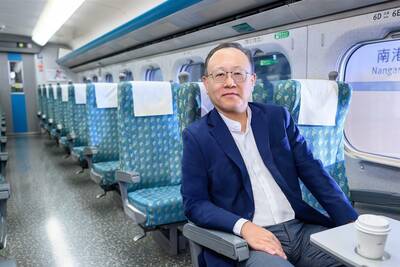The National Communications Commission (NCC) yesterday rejected Eastern Broadcasting Co (EBC) Asia’s applications to broadcast its three offshore TV channels on Chunghwa Telecom’s multimedia-on-demand system.
Eastern Broadcasting has three offshore channels: the Asian News channel, Asian Variety channel and YOYO Asia channel. It broadcasts in China, Hong Kong, Indonesia, Macau, Malaysia, the Philippines, Singapore and Thailand.
The company filed the application through Chang Ho Media Technology Co.
NCC Vice Chairman and spokesperson Wong Po-tsung (翁柏宗) said that the Satellite Broadcasting Act (衛星廣播電視法) stipulates different rules for domestic and offshore channels.
The commission oversees the operations of domestic channels based on their business plans, while it oversees offshore channels based on pledges they made to the commission, Wong said.
Certain regulations only apply to domestic channels, Wong added.
For example, Article 8 requires satellite channels to broadcast a certain share of domestically produced programs, while there is no such requirement for offshore channels, Wong said.
The commission found that most programs on Eastern Broadcasting’s offshore channels are produced by a California-based company and other local channels that belong to the same group, Wong said.
“While the applications were filed by Chang Ho, EBC remains the owner and operator of these three offshore channels and has the right to arrange the broadcast of programs and commercials,” Wong said. “However, EBC also owns domestic satellite channels, and an approval of the applications would be inconsistent with the NCC’s standards to regulate content.”
Chang Ho told NCC commissioners that the network had already established a subsidiary in Taiwan, and its Asia News channel is planning to recruit 100 staff for its news department, Wong said.
However, the commission found that the channel was still using the office, personnel and resources from the parent company, Wong said.
Programs on the three offshore channels and those on other channels of the group would not be distinct from each other, Wong said.
Taiwanese would not benefit much from the broadcast of these offshore channels, Wong said, adding that the channels would lack content diversity and there would not be enough funds for domestically produced programs.

The inspection equipment and data transmission system for new robotic dogs that Taipei is planning to use for sidewalk patrols were developed by a Taiwanese company, the city’s New Construction Office said today, dismissing concerns that the China-made robots could pose a security risk. The city is bringing in smart robotic dogs to help with sidewalk inspections, Taipei Deputy Mayor Lee Ssu-chuan (李四川) said on Facebook. Equipped with a panoramic surveillance system, the robots would be able to automatically flag problems and easily navigate narrow sidewalks, making inspections faster and more accurate, Lee said. By collecting more accurate data, they would help Taipei

STATS: Taiwan’s average life expectancy of 80.77 years was lower than that of Japan, Singapore and South Korea, but higher than in China, Malaysia and Indonesia Taiwan’s average life expectancy last year increased to 80.77 years, but was still not back to its pre-COVID-19 pandemic peak of 81.32 years in 2020, the Ministry of the Interior said yesterday. The average life expectancy last year increased the 0.54 years from 2023, the ministry said in a statement. For men and women, the average life expectancy last year was 77.42 years and 84.30 years respectively, up 0.48 years and 0.56 years from the previous year. Taiwan’s average life expectancy peaked at 81.32 years in 2020, as the nation was relatively unaffected by the pandemic that year. The metric

TAKING STOCK: The USMC is rebuilding a once-abandoned airfield in Palau to support large-scale ground operations as China’s missile range grows, Naval News reported The US Marine Corps (USMC) is considering new sites for stockpiling equipment in the West Pacific to harden military supply chains and enhance mobility across the Indo-Pacific region, US-based Naval News reported on Saturday. The proposed sites in Palau — one of Taiwan’s diplomatic allies — and Australia would enable a “rapid standup of stored equipment within a year” of the program’s approval, the report said, citing documents published by the USMC last month. In Palau, the service is rebuilding a formerly abandoned World War II-era airfield and establishing ancillary structures to support large-scale ground operations “as China’s missile range and magazine

Passengers on Taiwan High Speed Rail (THSR) will be required to use headphones and make phone calls in gangways under new “quiet travel” rules starting Sept. 22. THSR Chairman Shih Che (史哲) told media that THSR will run a three-month promotional campaign to ensure widespread adoption of the new rules. Those repeatedly ignoring the guidance face the potential termination of their transport contract, which can result in them getting escorted off the train, according to THSR. Shih shared his hope to cultivate an environment conducive to rest and reading for the train’s passengers, stating that these changes aim to “promote self-discipline” among passengers